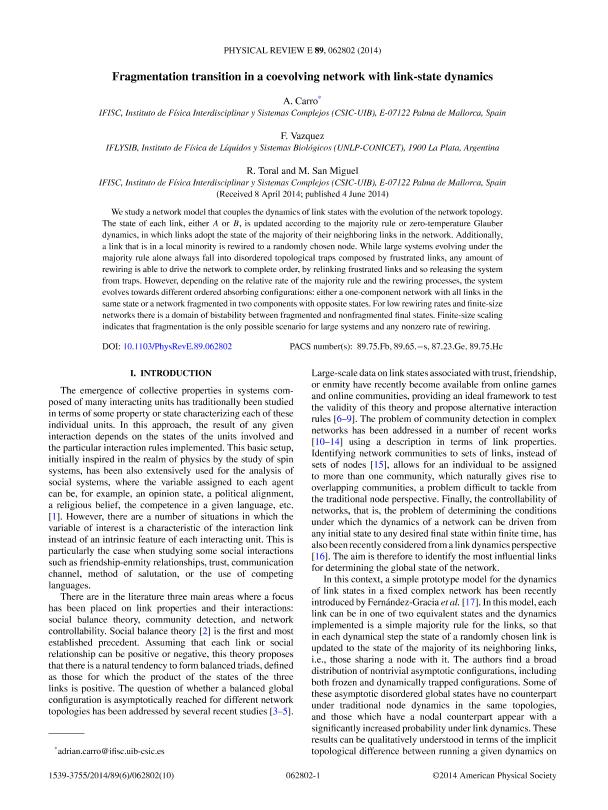Artículo
Fragmentation transition in a coevolving network with link-state dynamics
Fecha de publicación:
04/2014
Editorial:
American Physical Society
Revista:
Physical Review E: Statistical, Nonlinear and Soft Matter Physics
ISSN:
1539-3755
Idioma:
Inglés
Tipo de recurso:
Artículo publicado
Clasificación temática:
Resumen
We study a network model that couples the dynamics of link states with the evolution of the network topology. The state of each link, either A or B, is updated according to the majority rule or zero-temperature Glauber dynamics, in which links adopt the state of the majority of their neighboring links in the network. Additionally, a link that is in a local minority is rewired to a randomly chosen node. While large systems evolving under the majority rule alone always fall into disordered topological traps composed by frustrated links, any amount of rewiring is able to drive the network to complete order, by relinking frustrated links and so releasing the system from traps. However, depending on the relative rate of the majority rule and the rewiring processes, the system evolves towards different ordered absorbing configurations: either a one-component network with all links in the same state or a network fragmented in two components with opposite states. For low rewiring rates and finite-size networks there is a domain of bistability between fragmented and nonfragmented final states. Finite-size scaling indicates that fragmentation is the only possible scenario for large systems and any nonzero rate of rewiring.
Palabras clave:
Link States
,
Galuber Dynamics
,
Topological Traps
,
Fragmentation
Archivos asociados
Licencia
Identificadores
Colecciones
Articulos(IFLYSIB)
Articulos de INST.FISICA DE LIQUIDOS Y SIST.BIOLOGICOS (I)
Articulos de INST.FISICA DE LIQUIDOS Y SIST.BIOLOGICOS (I)
Citación
San Miguel, M.; Toral, R.; Vazquez, Federico; Carro, A.; Fragmentation transition in a coevolving network with link-state dynamics; American Physical Society; Physical Review E: Statistical, Nonlinear and Soft Matter Physics; 89; 6; 4-2014; 1-10
Compartir
Altmétricas




